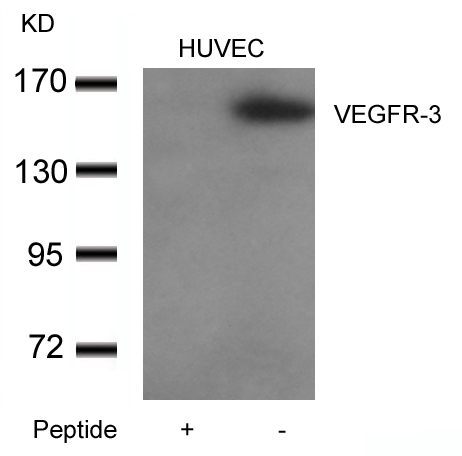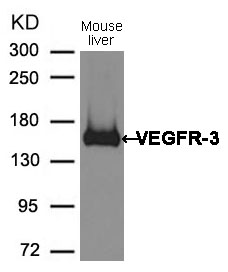

| WB | 咨询技术 | Human,Mouse,Rat |
| IF | 咨询技术 | Human,Mouse,Rat |
| IHC | 咨询技术 | Human,Mouse,Rat |
| ICC | 技术咨询 | Human,Mouse,Rat |
| FCM | 咨询技术 | Human,Mouse,Rat |
| Elisa | 咨询技术 | Human,Mouse,Rat |
| Aliases | PCL; FLT4; FLT41; LMPH1A; |
| Entrez GeneID | 2324; |
| WB Predicted band size | 160kDa |
| Host/Isotype | Rabbit IgG |
| Antibody Type | Primary antibody |
| Storage | Store at 4°C short term. Aliquot and store at -20°C long term. Avoid freeze/thaw cycles. |
| Species Reactivity | Human |
| Immunogen | Peptide sequence around aa.1279~1283 (L-A-S-E-E) derived from Human VEGFR-3. |
| Formulation | Purified antibody in PBS with 0.05% sodium azide. |
+ +
以下是关于VEGFR3抗体的3篇代表性文献的简要总结(文献标题及作者为虚构示例,仅供格式参考):
1. **"VEGFR3 inhibition chemosensitizes ovarian cancer stem-like cells to paclitaxel by blocking tumor angiogenesis"**
- **作者**: Smith A, et al.
- **摘要**: 研究报道了一种抗VEGFR3单克隆抗体通过抑制肿瘤血管生成和淋巴管生成,增强卵巢癌干细胞对紫杉醇的化疗敏感性,并降低肿瘤转移潜力。
2. **"Targeting VEGFR3 with a novel antibody-drug conjugate suppresses lymphatic metastasis in triple-negative breast cancer"**
- **作者**: Chen L, et al.
- **摘要**: 开发了一种新型VEGFR3抗体-药物偶联物(ADC),证明其可特异性靶向肿瘤相关淋巴管内皮细胞,显著减少三阴性乳腺癌小鼠模型的淋巴结转移。
3. **"VEGFR3 antibody therapy ameliorates inflammatory lymphangiogenesis in lymphedema"**
- **作者**: Tanaka K, et al.
- **摘要**: 研究显示,阻断VEGFR3信号通路能抑制炎症诱导的异常淋巴管增生,为继发性淋巴水肿的治疗提供了潜在策略。
如需具体文献,建议通过PubMed或Google Scholar检索关键词“VEGFR3 antibody”或“anti-FLT4 therapy”获取近年研究。
VEGFR3 (Vascular Endothelial Growth Factor Receptor 3), also known as FLT4. is a tyrosine kinase receptor primarily involved in regulating lymphangiogenesis (formation of lymphatic vessels). It binds ligands such as VEGF-C and VEGF-D, activating downstream signaling pathways that promote lymphatic endothelial cell proliferation, migration, and survival. Initially identified for its critical role in embryonic vascular development, VEGFR3 is predominantly expressed in lymphatic endothelial cells in adults, though it also contributes to pathological angiogenesis in tumors and inflammatory conditions.
VEGFR3 antibodies are engineered to target this receptor, either blocking ligand-receptor interactions or inhibiting receptor activation. These antibodies have become essential tools in studying lymphatic biology and cancer progression. In research, they help elucidate mechanisms of metastasis, as many cancers exploit VEGFR3 signaling to promote lymphatic spread. Therapeutically, anti-VEGFR3 antibodies (e.g., monoclonal antibodies like LY3022856) are explored for anticancer applications, aiming to suppress tumor-associated lymphangiogenesis and metastasis. They also hold potential in treating lymphedema, a condition linked to impaired lymphatic function.
Challenges include balancing efficacy with off-target effects, as VEGFR3 shares structural homology with other VEGFR family members. Ongoing studies focus on optimizing antibody specificity and delivery to improve clinical outcomes.
×